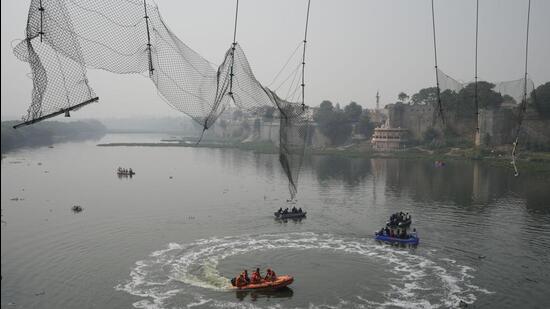From dam burst to earthquake, Morbi has bounced back after tragedies
Residents count resilience among the factors that have contributed to Morbi’s emergence as India’s ceramic capital
On August 9, 1979, Machchhu Dam burst after week-long monsoon rains in Gujarat and devastated the industrial city of Morbi and surrounding areas downstream. Thousands of people died while scores of roof tile factories were among those washed before the industry rebounded, thanks largely to the government’s help.

Morbi would also emerge as the country’s wall clock manufacturing hub after the dam tragedy, listed as the worst burst in the Guinness Book of World Records, and the country’s largest ceramic hub after the 2001 earthquake that claimed hundreds of lives.
“We bounce back stronger after every tragedy,” said Keyur Bhuva, owner of Mozart, one of the leading ceramic manufacturers in Morbi, which faced another tragedy last month following the bridge collapse that left 135 people dead.
Residents count resilience among the factors that have contributed to Morbi’s emergence as India’s ceramic capital. They say it overcame setbacks to the industry in 2017 following the introduction of the GST within months.
The industry bounced back thanks to the supply void due to frequent Covid-19 lockdowns in China, the world leader in ceramic manufacturing, after 300 factories were shut down here due to weak domestic demand during the second pandemic wave.
In a June 2021 report, Edelweiss Research said the demand for exports rose to 35-40% from pre-Covid levels. The exports were likely to touch more than 50% over the next two years. In 2021, ceramic exports were worth ₹13,000-14,000 crore. Over 90% of India’s ceramics are produced in Morbi. Products for the world’s leading brands are produced here through the outsourcing model. Morbi has over 950 factories.
On Wednesday last, the industry joined the mourning for the people killed in the bridge collapse. The industry was back producing millions of tiles a day later.
Almost everything in Morbi and its surrounding areas is about tiles. Thousands of hoardings are about them and sanitaryware. Virtually every road leads to businesses with something to do with tiles. Every other business here is directly or indirectly related to or dependent on the industry. And every second family has someone or the other in the tiles business.
Pravin Vyas, a local journalist, said it began with roof tiles made of red clay found primarily in Morbi and in Karnataka’s Mangaluru. “This clay needs lower temperature and lesser fuel for making tiles.”
The region’s potters produced roof tiles before independence before moving to cement mosaic tiles in the 1960s.
Bhuva said when ceramic tiles began to be produced, the top factories would produce only about 350 boxes of 6x6 inch tiles. “Today, there are individual factories producing every day over 40,000 boxes of tiles of sizes as large as 1.2x3 metre.”
Dalsukhbhai Patel, a manager at a tiles factory, said people from other parts of Gujarat joke about something special in the waters of Machchu that has helped them prosper in the tiles business.
Mukesh Kundariya, the president of Morbi’s Vitrified Tiles Association, said the entrepreneurship skills of the locals have been driving the business. “There is a strong sense of community among us. ...There is healthy competition here. We help each other grow.”
Bhuva said the import of technologically advanced machines around 2011 gave a boost to the industry. Morbi is among the highest source of taxes in the country. “There are many factories with an annual turnover of over ₹500 crore,” said Nikunj Vakani, a local resident.
Morbi’s location is also crucial. “Be it for import of clay from Rajasthan or Kutch, or the ports from where export happens, Morbi happens to be located favourably,” said Jivraj Patel, who owns a showroom in Morbi. He said the clay is mostly imported from Rajasthan, Kutch, and even Ukraine and Russia.
There are an estimated 700,000 people directly or indirectly connected to the tiles trade in Morbi. “Every three in four such persons are migrants,” said Devesh Javia, a manufacturer.
Morbi also has paper mills and clock manufacturing units, which the city has always been known for.
Lakshman Das, a tiles designer from Bihar who earns ₹30,000 monthly, said most factories provide free accommodation to their workers. “Every woman in our families can find work,” he said. He added this makes Morbi attractive to migrant workers. Das has brought seven relatives and dozens of people from Bihar to work here.
Gulshan Devi, a woman from Bengal who works as a cook-cum-cleaner at a factory, said the ban on liquor means more savings.
Morbi faces air pollution generated by the tiles industry and dusty roads. There are also growing concerns about depleting clay reserves as the industry has used it for over 100 years. Unscientific mining has also resulted in the contamination of groundwater.
“Air pollution is the price I pay for financial prosperity,” said Abhishek Pandey, a native of Uttar Pradesh’s Jaunpur, who works as a manager at a sanitaryware plant in Morbi.





